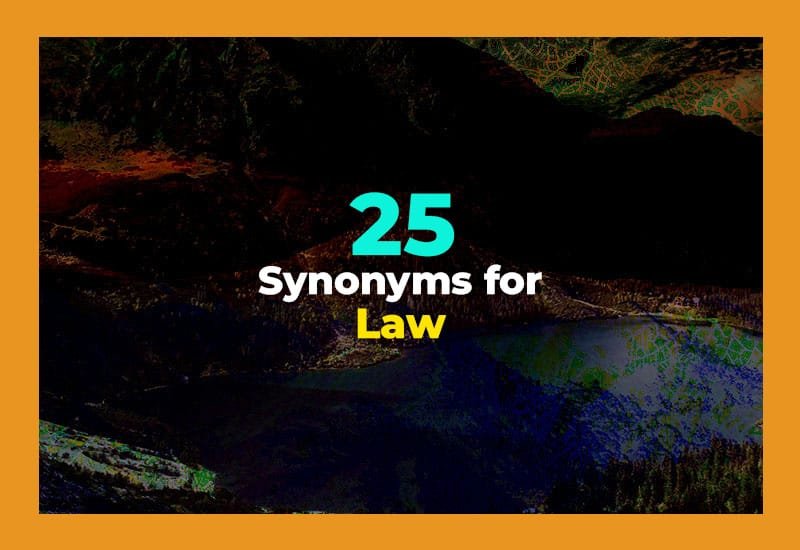Law is something we follow every day, even if we do not always think about it. Words like rule, regulation, and guideline all mean law in some way. They show the idea of something we must follow to stay safe and fair. In this article, we will look at 25 easy synonyms for law, how they are used, and give examples to make them simple to understand.
25 Different Ways to Say LAW: Another Word for Law
Rule
A rule is a clear instruction about what you can or cannot do. Rules are used in schools, games, and daily life to keep things fair and organized. They work as a synonym for law because both tell people how to behave. You can use rule when talking about simple regulations or instructions that guide behavior without being too formal. Using rule makes the idea of law easier to understand for everyone.
- You must follow the rule about no running in the hallway.
- The game has a rule that everyone must take turns.
- Our classroom rule is to always be kind to others.
Regulation
Regulation is a formal way to control how things are done. It is used in business, government, or any area where specific rules are needed. Regulations work like laws because they tell people what is allowed and what is not. They often have consequences if not followed. Use regulation when you want to sound more official but still explain rules that must be obeyed.
- The city has a new regulation about parking on the street.
- Food companies must follow safety regulations.
- The school made a regulation to keep the playground clean.
Guideline
A guideline is advice or instruction on how to act or do something. It is not always strict, but it helps people follow the right path. Guidelines are similar to laws because they guide behavior and create order. You can use guideline in workplaces, schools, or health advice. Guidelines make understanding law easier because they show what is expected without being harsh or strict.
- The teacher gave guidelines for the homework project.
- There are health guidelines for washing your hands properly.
- The company shared guidelines for working from home.
Policy
A policy is a plan or rule set by an organization or group. Policies are meant to control actions and make sure everyone follows the same standards. They are like laws inside a smaller group, such as a company or school. You use policy to explain rules that are written down and meant to be followed carefully. Policies help maintain fairness and order in groups or businesses.
- The school has a policy about using phones in class.
- Our office policy says to dress neatly every day.
- The store has a return policy for all products.
Order
An order is a command or instruction that must be followed. It can come from a person in charge or an authority. Orders work as a law synonym because they tell people what to do and often require immediate action. You can use order for rules in the military, workplace, or even at home. Orders make clear what is required without needing complicated explanations.
- The general gave an order to start the drill.
- Mom made an order that everyone cleans their room.
- The teacher gave an order to line up quietly.
Code
A code is a set of rules or laws collected together. Codes are often written down and organized so people can easily follow them. Using code as a synonym for law is common in legal and professional areas. You can use it when talking about official rules that guide behavior in certain fields like law, computers, or safety.
- The building follows a fire safety code.
- Lawyers study the criminal code to understand crimes.
- The city updated its building code last year.
Statute
A statute is a law made by a government or authority. It is written down and must be followed by everyone it affects. Statutes are used when talking about official rules or formal laws. You can use statute to show the legal side of law, especially in government or legal studies. It helps people understand laws as formal and enforceable rules.
- The state passed a statute about texting while driving.
- Statutes protect workers from unsafe conditions.
- There is a statute that requires seat belts in cars.
Act
An act is a law passed by a government or parliament. It is official and applies to all people under its authority. Acts are similar to statutes but often refer to the entire document that creates a law. You use act when talking about formal legal rules or new laws. Acts make law easier to discuss because they show the law has been approved officially.
- The government introduced a new act for environmental protection.
- The act makes it illegal to park in front of fire hydrants.
- Schools must follow the education act rules.
Requirement
A requirement is something that must be done or met. It is not always called a law but works like one because it sets rules for behavior. You can use requirement to explain what is necessary to follow a law, rule, or regulation. Requirements are clear and help people understand the expectations in simple terms.
- Wearing a helmet is a requirement for riding a bike.
- One requirement for the job is good communication skills.
- Meeting deadlines is a requirement for students.
Command
A command is a direct order from someone in authority. Commands work like laws because they tell people what to do and often must be followed immediately. You can use command in military, workplace, or personal situations to explain strict instructions. Commands show the power behind rules and help maintain control.
- The officer gave a command to stop immediately.
- The coach gave a command to start the practice.
- Parents gave a command to clean up the toys.
Decree
A decree is an official order made by someone in authority. It is like a law because people must obey it. Decrees are usually formal and written down. You can use decree when talking about government or official decisions that are binding. It makes law sound important and official.
- The king issued a decree to protect forests.
- A new decree banned smoking in public places.
- The mayor made a decree about street cleaning.
Principle
A principle is a basic idea or rule that guides actions. It is not always formal like law, but it shows the right way to act. Principles work as a synonym for law because they influence behavior and decisions. You can use principle when talking about ethics, rules, or personal beliefs that guide actions.
- Honesty is a principle we should follow every day.
- The principle of fairness guides the teacher's decisions.
- Safety principles are important at the construction site.
Standard
A standard is a level of quality or a rule to follow. It works like law because it tells people what is acceptable or expected. You can use standard in schools, workplaces, or daily life to explain rules and expectations. Standards make law easier to understand because they show what is considered normal or right behavior.
- The company has high standards for customer service.
- Students must meet the standard for passing exams.
- Safety standards keep workers safe in factories.
Directive
A directive is an official instruction or order. It is similar to law because it tells people what must be done. You can use directive in workplaces, government, or organizations. Directives make rules clear and help people follow proper procedures. They are practical and easy to understand.
- The manager issued a directive about working hours.
- The government sent a directive to improve healthcare.
- Teachers followed a directive to start online classes.
Ordinance
An ordinance is a local law made by a city or town. It works like law because everyone must follow it. You can use ordinance to explain rules that apply in a specific area, like parking, noise, or buildings. Ordinances make local law easier to understand for communities.
- The city passed an ordinance to ban loud music at night.
- A new ordinance requires pets to be leashed in parks.
- The town made an ordinance for street cleaning days.
Norm
A norm is an accepted way of behaving. It is not official like law but works like it socially. Norms guide people on what is right or wrong in a community. You can use norm to explain informal rules or habits that everyone follows. Norms make understanding law easier because they show expectations in everyday life.
- It is a norm to say thank you when someone helps you.
- In our culture, helping neighbors is a social norm.
- Wearing uniforms is a norm in many schools.
Restriction
A restriction limits what people can do. It works like a law because it sets boundaries and rules. You can use restriction to talk about limits in law, rules, or daily life. Restrictions make expectations clear and prevent mistakes or harm.
- There is a restriction on using phones in class.
- The park has a restriction on camping after dark.
- Parents set a restriction on how much TV children can watch.
Instruction
An instruction tells someone how to do something. It works like a law when it guides proper behavior or actions. Instructions are simple rules that can be followed easily. You can use instruction in schools, workplaces, or at home to explain rules or steps that must be followed.
- The teacher gave instructions for the project.
- The manual has instructions for setting up the computer.
- Parents gave instructions for cleaning the kitchen.
Protocol
A protocol is a set of rules for formal situations. It works like law because it guides behavior and actions. You can use protocol in government, business, or events. Protocols make sure everything is done correctly and fairly. They are important in formal or official settings.
- The diplomat followed the correct protocol at the meeting.
- Hospital staff follow a strict protocol for surgeries.
- The ceremony had a protocol to follow for seating guests.
Framework
A framework is a system of rules or ideas. It works like law because it organizes how things should be done. You can use framework in work, law, or learning. Frameworks make law easier to understand because they show structure and order.
- The school created a framework for teaching online.
- The government uses a legal framework for new policies.
- The project has a framework to guide all team members.
Convention
A convention is a widely accepted rule or practice. It works like law socially or in international agreements. You can use convention to explain normal behaviors or agreements that must be followed. Conventions make law easier to understand by showing what is agreed upon by most people.
- It is a convention to shake hands when meeting someone.
- The country signed an international convention on climate change.
- School conventions include being polite to teachers.
Procedure
A procedure is a step-by-step way to do something. It works like law because it sets clear rules for actions. You can use procedure in work, school, or daily life. Procedures make following rules easier and prevent mistakes.
- Follow the procedure to submit your homework.
- Doctors follow a strict procedure during surgeries.
- The office has a procedure for reporting problems.
Mandate
A mandate is an official order or requirement. It works like law because it must be followed. You can use mandate for government, business, or rules. Mandates make rules clear and formal, ensuring everyone understands what is expected.
- The mayor issued a mandate to wear masks.
- The school has a mandate for daily attendance.
- A new mandate requires workers to complete safety training.
Measure
A measure is an action taken to follow a rule or law. It works like law because it protects people and maintains order. You can use measure when talking about rules, policies, or actions that ensure safety. Measures show practical ways to follow laws or rules.
- The city took measures to prevent flooding.
- Schools implemented safety measures during exams.
- The company adopted measures to reduce pollution.
Edict
An edict is an official order from authority. It works like law because it must be obeyed. You can use edict for historical, government, or formal rules. Edicts make laws sound serious and official.
- The king issued an edict banning hunting in the forest.
- A new edict requires all shops to close by 9 PM.
- The government announced an edict for tax changes.
Table of Synonyms for Law
| Synonym | Example |
|---|---|
| Rule | You must follow the rule about no running in the hallway. |
| Regulation | The city has a new regulation about parking on the street. |
| Guideline | The teacher gave guidelines for the homework project. |
| Policy | The school has a policy about using phones in class. |
| Order | The general gave an order to start the drill. |
| Code | The building follows a fire safety code. |
| Statute | The state passed a statute about texting while driving. |
| Act | The government introduced a new act for environmental protection. |
| Requirement | Wearing a helmet is a requirement for riding a bike. |
| Command | The officer gave a command to stop immediately. |
| Decree | The king issued a decree to protect forests. |
| Principle | Honesty is a principle we should follow every day. |
| Standard | The company has high standards for customer service. |
| Directive | The manager issued a directive about working hours. |
| Ordinance | The city passed an ordinance to ban loud music at night. |
| Norm | It is a norm to say thank you when someone helps you. |
| Restriction | There is a restriction on using phones in class. |
| Instruction | The teacher gave instructions for the project. |
| Protocol | The diplomat followed the correct protocol at the meeting. |
| Framework | The school created a framework for teaching online. |
| Convention | It is a convention to shake hands when meeting someone. |
| Procedure | Follow the procedure to submit your homework. |
| Mandate | The mayor issued a mandate to wear masks. |
| Measure | The city took measures to prevent flooding. |
| Edict | The king issued an edict banning hunting in the forest. |

Final Thoughts
I hope this list of 25 easy synonyms for law helps you understand different ways to talk about rules and regulations. Each word can be used in casual or formal situations. Using these words makes conversations more interesting and clear. Whether you are writing, speaking, or learning about laws, these synonyms give you simple ways to explain rules in everyday life and keep things fair and organized.









